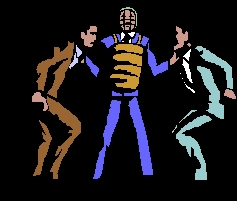
In the scuffle, Umali stabbed Blake in the groin, severing his femoral artery and causing him to bleed to death. Although Umali tried to conceal what had transpired, he was eventually caught and indicted.
At his trial, Umali alleged that "he stabbed Blake in order to protect [Chan] from the use of deadly physical force."
While the defendant was testifying, the court was forced to recess for a four-day period and ordered Umali to refrain from talking to his lawyer. A day and a half later, defense counsel objected to the directive, and the court agreed the "ban" was "impermissible" -- leaving only two and a half days for Umali to consult with his attorney.
After he was convicted of manslaughter in the first degree, Umali appealed to the Appellate Division, First Department, contending the gap of time was prejudicial and warranted the conviction's reversal. Umali also claimed the instructions given to the jury regarding his "justification defense" were deficient since the judge indicated the evidence had to establish "beyond a reasonable doubt" that Umali believed he was trying to prevent Blake from using deadly physical force on Chan when, in actuality, prosecutors had the "burden to prove [beyond a reasonable doubt] that defendant did not believe force was needed."
Finding neither argument convincing, the AD1 affirmed.
On appeal to our state's highest court, the New York State Court of Appeals thought Umali's inability to confer with counsel was "insignificant," and while the jury instructions were not perfect, any error was seen as harmless since "a charge may be sufficient, indeed substantially correct, even though it contains phrases which, isolated from their context, seem erroneous."
The Court of Appeals reviewed the "context and content of the entire charge," and determined there was no risk of jury confusion since the jury was "repeatedly reminded that the burden was on the prosecution to prove its case beyond a reasonable doubt," that this burden never shifted to Umali, and the jury "never expressed any confusion about the justification charge or asked for supplemental instructions on the subject."
How justifiable was that?
 To download a copy of the Court of Appeals' decision, please use this link: People v. Umali
To download a copy of the Court of Appeals' decision, please use this link: People v. Umali
